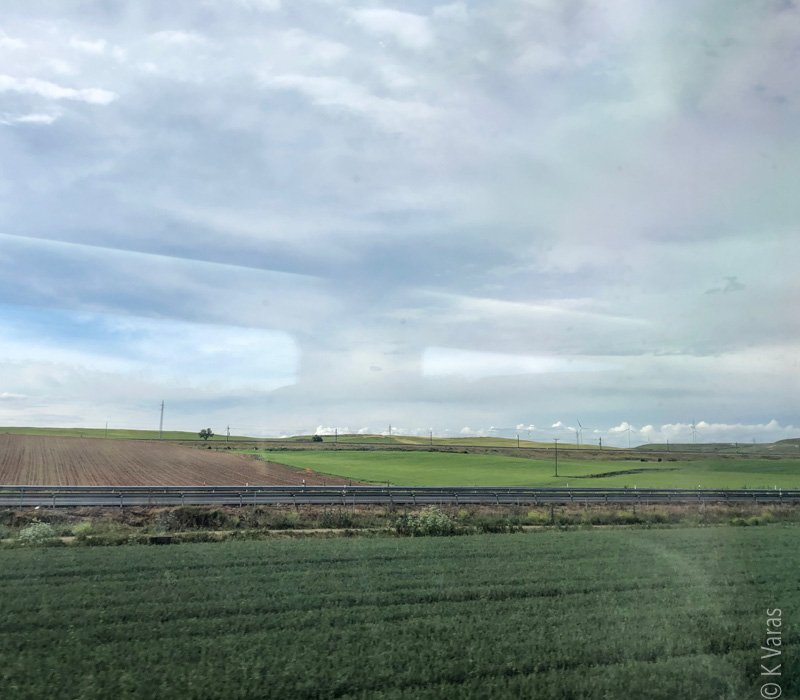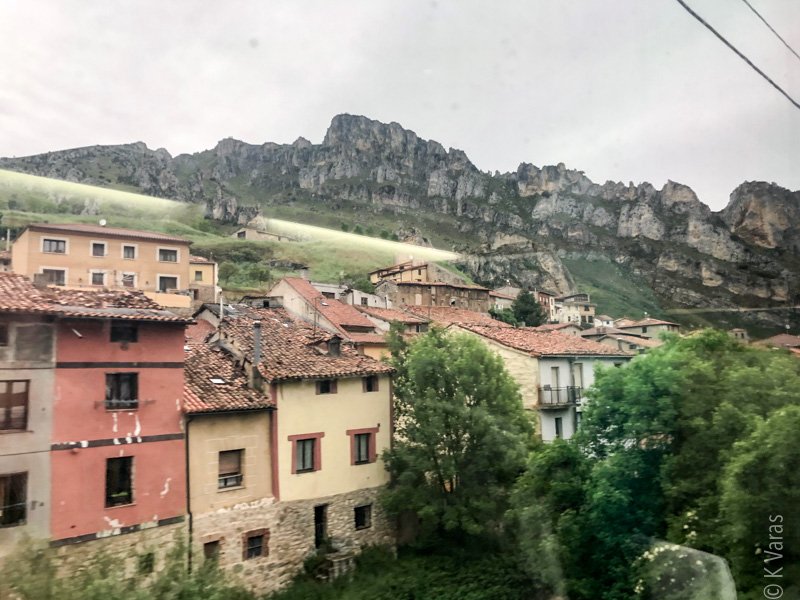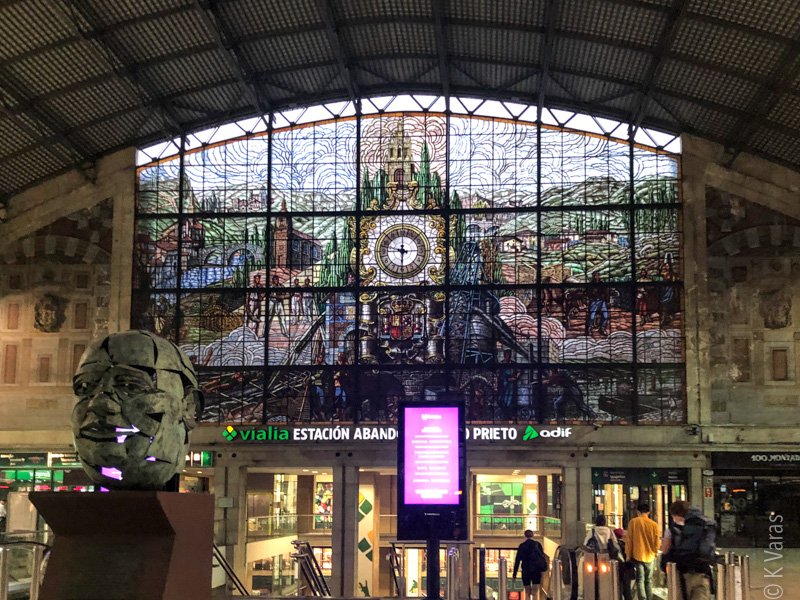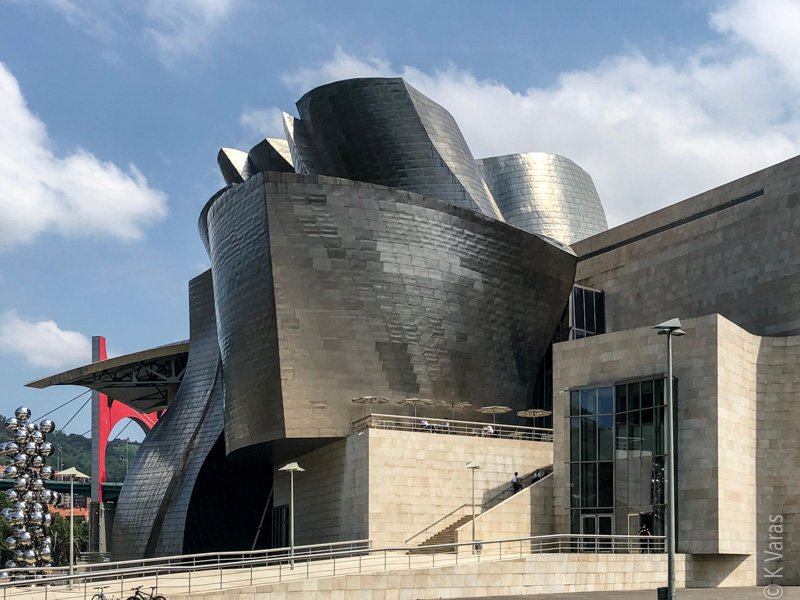
Heading: North
Technically, I’ve been heading north since I left Dénia, but now I was finally going further north than I’ve ever been in Spain: to the Basque Country. Países Vascos, or as they prefer to be called, Euskadi, is Spain’s most unique Comunidad Autonoma. Geographically isolated, it is also the richest, with the highest incomes and standard of living. The fact that they speak a language that’s unlike any other on Earth just adds to their mystique. I was really looking forward to figuring them out, at least a bit.
I started off by leaving Madrid on a not-so-fast train to Bilbao. I was a little surprised there wasn’t an AVE (fast train) available so I settled in for the 5-hour ride, which, I have to admit, went by quite quickly. I do love travelling like this so much: loads of space, everyone masked, quiet, the relaxing motion of the train … what more could one ask for? The views! I forgot to mention the views! Since I had never been this far north of Madrid, it was fun to watch the landscape change. First, of course, was the Cordillera Central, the mountain range that guards the capital to the north. It was more hilly than mountainous but maybe we just didn’t get close enough to the bigger peaks. Beyond that were the plains of Castilla y León and then … and then the really big mountains started. And these mountains had a very serious look about them.

I’m used to the way the Rockies look, and, for that matter, all the mountain ranges in southern BC. I don’t remember ever calling them “angry” but that’s what I could not help but think when I looked out of the train window. Not only were the rock faces massive, they had an ominous look to them that seemed to shout “you shall not pass!” I have to admit, if I were an invading force (say, like the Umayyad armies that conquered Spain some 1300 years ago), I would have taken one look at these peaks and said “nah, I’m good, I have enough land,” and promptly turned around and gone back to the more pleasant rolling hills to the south. I also have a suspicion that that is exactly what happened: the conquerors reached Pamplona, in the foothills of Basque mountains, and never penetrated further north. If anyone tells you that was a political decision, I will counter with photos of the terrain and I’ll be right.

It was fascinating to watch this landscape, and the towns we passed seemed to hug the foothills, their buildings much more rugged and sturdy looking than I’d seen anywhere else in Spain. The people who built their homes here knew something about surviving the elements, but they also seemed to know the comfort of protection those elements provided.
As I sat on the train for those five-plus hours, I attempted to learn a few basic expressions in Euskara, the mind-bending language that nobody knows much about. Sure, some 750,000 people speak it natively, and I’m sure a few more would like to learn it, but judging by how hard it was for me to learn a handful of expressions, I tip my hat to anyone who attempts to become proficient in it. I tried to learn these 10 expressions:
- Kaixo —> Hello
- Egun on —> Good morning
- Arratsalde on —> Good afternoon
- Gabon —> Good evening/night
- Agur —> Goodbye
- Bai —> Yes
- Ez —> No
- Eskerrik asko —> Thank you
- Barkatu —> Excuse me
- Mesedez —> Please
I even wrote them out for myself on a slip of paper for quick access … after a couple of hours of practicing, I barely got down these two: kaixo, and agur. There is something about these other letter combinations that just didn’t want to stick to my brain! I was really hoping I wouldn’t feel completely stupid trying to communicate with people.
Fortunately, my fears were all for nothing. As I got off the train in Bilbao’s beautiful train station, I saw signs in Spanish as well as Basque (I will try to use Euskara as much as possible, but for now I thought I’d ease you into it), and it was easy to find the taxi line. The driver was very nice and, of course, spoke Spanish to me, but as I got out of the car and retrieved my suitcases, I got my first taste of agur. I was very happy to recognize it and quickly adopted it as my preferred word to use when departing. In a way, I said agur to hasta luego (the most common farewell expression I’ve encountered so far).

I landed at the AirBnB a bit early (not in real time, it was almost 10pm), and the guy I was supposed to meet there hadn’t arrived yet. Instead, I was “accosted” by a group of young people who seemed to know who I was, and most of them turned out to be my new housemates. After piling into yet another tiny elevator, I was introduced to a rather interesting apartment, and the “kids” who lived there. One of them, S., was very kind to share some food with me, since there are no stores open past 9pm in this town, and it was too late to go and grab anything else. I guess I got spoiled by both València and Madrid, where you can always find something open late into the night. Ah, the joy of adjusting to a new city … it’s always an adventure.
I’m happy to report my room is very nice … the jury is still out on the rest of the place.





